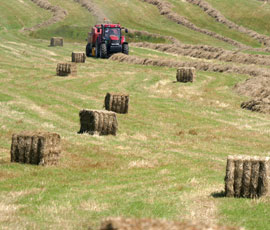Wet weather prompts hay fire warning

Loss adjusters are warning of a potential increase in barn fires caused by the spontaneous combustion of hay bales harvested following wet weather.
Farmers should take considered stacking at risk hay outside and away from farm buildings, said Nigel Collinson, managing director of loss adjusters Agrical.
“The chance of hay bales spontaneously combusting is higher when we’ve had a lot of rain – which we certainly have had over the last month.
“If farmers bale the hay before it’s dried out enough, the risk of spontaneous combustion increases as it’s the moisture in the grass which causes the heat to rise inside the bale.”
Mr Collinson accepted it was a hard call for farmers because the timing of baling was not an exact science and often down to experience and knowledge, as well as local conditions.
“There are so many variables and the timing of baling may be out of the farmer’s control to a certain extent, as it may rely on the availability of contractors,” he said.
“We’re not trying to teach farmers to suck eggs but we’re urging them to think about the storage of bales which may pose a risk.”
Scientists have found it hard to establish a unified theory of why hay can spontaneously combust.
But numerous types of grass, grown in various locations and subjected to different weather conditions – meadow grass retains more moisture than rye grass for example.
Dangerous heating can happen in hay that contains more than 20-25% moisture content and the largest number of fires happen within four to five weeks of storage.
The process begins with anaerobic microbiological activity within baled hay which produces heat.
If the activity continues through on-going chemical reactions fuelled by higher levels of moisture then the risk of combustion will increase markedly.
Mr Collinson said farmers should therefore avoid baling grass that was too wet or too green.
At risk bales should only be moved inside after time.
Farmers should also ensure plenty of ventilation in the stack, testing the temperature frequently by using an electronic probe.
A musty smell or smell of caramel was a sign that a stack was producing heat.
“Somehow farmers have to weigh up the risk of a potentially spoilt crop against baling the hay too early and having an increased risk of combustion within the stack.
“In our experience many of the farm fires we’ll be called out to from early July to the beginning of August will be down to spontaneous combustion.
“Bizarrely when we have a short spell of good weather the race is on to get the hay in and we experience more claims.
“Conversely when the weather is unsettled, farmers have no option but to leave the hay out longer and we see fewer claims.”
